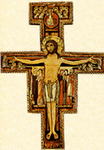The Wonder of Lights -- A Blessed Hanukkah!
 As Christians are bustling preparing for the annual celebration of the Messiah's birth in just a few days, our "elder brothers (and sisters)", as the late Pope John Paul II referred to the Jewish community, are celebrating the annual festival of lights called Hanukkah.
As Christians are bustling preparing for the annual celebration of the Messiah's birth in just a few days, our "elder brothers (and sisters)", as the late Pope John Paul II referred to the Jewish community, are celebrating the annual festival of lights called Hanukkah.
This commemorates the rededication of the Second Temple after the Maccabean revolt about two hundred years before the birth of Jesus Christ. The Seleucid Syrian Greeks under King Antiochus IV Epiphanes had taken over the region of Palestine after the time of Alexander the Great. The king sought to impose Greek customs upon all his subjects in the Middle East, including the Jews.
This included the gymnasium (in which participants played athletic games in the nude, according to the Greek custom), which was rendered abominable to Jewish sensibilities. Furthermore, Antiochus IV Epiphanes, considering himself divine, sought to force the Jews to abandon monotheism and support the Greek polytheistic tradition by placing a statue of Zeus in the Temple in Jerusalem!
Many Jews agreed to accommodate to "keep the peace" and some had the mark of circumcision covered, a very painful process that resulted in hiding a man's distinctive Jewish character. The Seleucid Hellenized Syrians also sought to have Jews abandon other practices of the Law of Moses, including the refusal to eat pork.
Eleazar, an old man, became a martyr for staunchly refusing to give into the pagan demands that he violate the Law which God had given Israel (cf. 2 Maccabees 6:18031). There is also the famous story of the seven brothers who were slaughtered in front of their mother for also refusing to surrender to the demands of the Gentiles, the mother being the last to be murdered (cf. 2 Maccabees 7:1-42).
Surprisingly, the Maccabean revolt succeeded in driving out the Seleucid Greeks and re-establishing a Jewish entity. They purified the Temple by ritually cleansing it of idolatrous defilement and rededicating it. There are two variations to the story (cf. 1 Maccabees 4:52059; 2 Maccabees 10:1-9), both recalling God's faithfulness to the Jewish armies and to rededicate the Second Temple for its holy and noble purpose, celebrating for eight days and this to be commemorated for perpetuity.
The celebration begins, then, on the twenty-fifth day of Chislev, according to the narrative. Since the Jewish calendar is lunar and not solar the dates change.
Tonight marks the beginning of the Third Day of Hanukkah (see above) with the lighting of the Hanukkah menorah (eight branched candle specifically for this feast). It is not only a feast for the children (and the accompanying gift-giving and playing with the dreidle [a traditional top for games]) but a feast for all the Jewish people to remember once again God's faithfulness.
God delivered Israel from the slavery of Pharoah; God delivered the Israelites from their many enemies; God raised up King David and the Prophets; God brought back the exiles from Babylon to the Holy Land; God gave us Jesus, his only-begotten Son (cf. John 3:16) from among Israel in the flesh (cf. Romans 1:2-3; Matthew 1:1-17).
This feast, by the way, is recounted in the Gospel of John (cf. 10:22). As Christians we believe that Jesus has fulfilled the Law of Moses and the Prophets and that he himself is the fulfillment of all the Jewish feasts. In fact, Jesus Christ is the Light of the world! (cf. John 8:12).


No comments:
Post a Comment